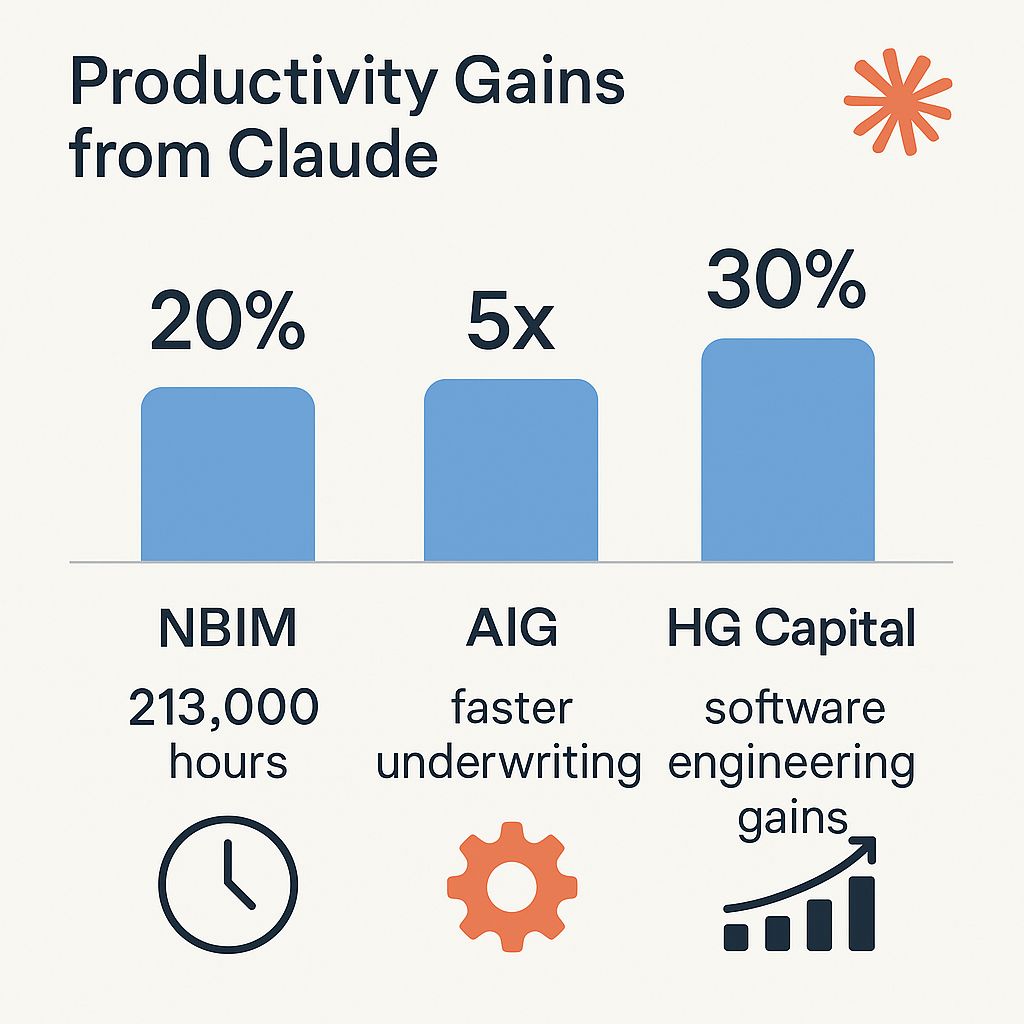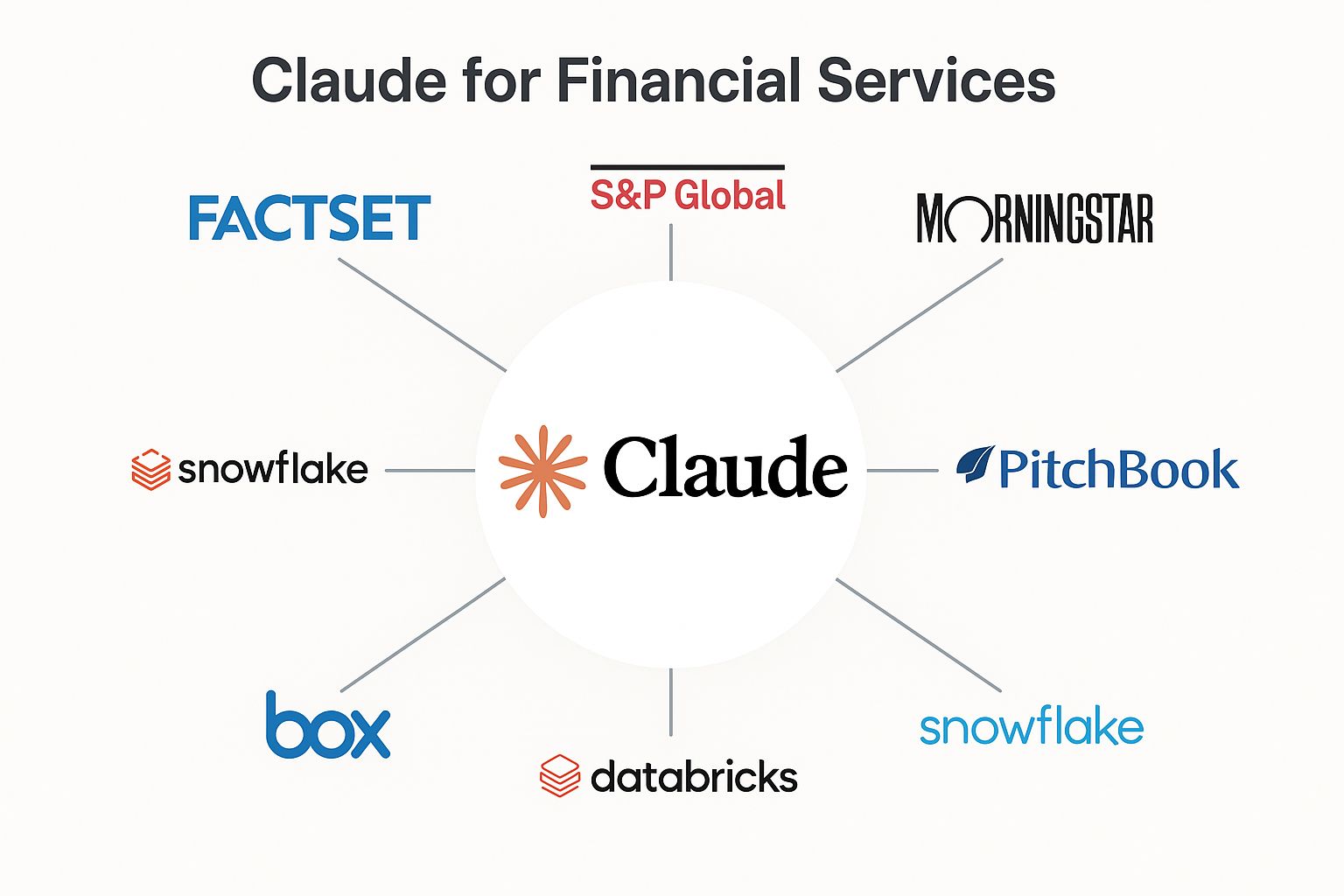About
Last week, Anthropic dropped something that should make every small business owner pay attention: Claude for Financial Services—an AI platform that's already saving companies millions in consulting fees and strategic planning costs.

Here's what caught my eye: The Norwegian Sovereign Wealth Fund just replaced what would have cost them 100+ expensive financial analysts. AIG eliminated weeks of costly underwriting delays. HG Capital achieved 30% productivity gains across their portfolio companies.
But here's the kicker—the breakthrough principles behind these enterprise wins aren't just for billion-dollar companies. They're a roadmap for any business tired of paying expensive consultants for strategic analysis, financial modeling, or market research that AI can now do in minutes.
Anthropic just proved that AI can handle the most complex, high-stakes business decisions. The question isn't whether this technology works—it's how quickly you can steal these 5 principles to slash your consulting costs and get better strategic guidance than you've ever had access to.
Introduction
💰 Why This Should Terrify Your Consultant (And Excite Your CFO)

Source: Anthropic's Claude for Financial Services announcement
Remember the last time you needed serious strategic analysis? You probably:
Waited 3 weeks for a market research report
Paid through the nose for financial modeling
Got analysis that was already outdated by delivery
Wondered if you could have done it better yourself (spoiler: you probably could have)
What if I told you that AI just made that entire painful process obsolete? Not "ChatGPT writes better emails" obsolete. More like "why am I paying consultants when AI does this faster, cheaper, and often better" obsolete.
The breakthrough numbers that matter:
Claude 4: Outperforms other frontier models on financial reasoning tasks
83% accuracy: On complex Excel tasks that stump most analysts
Real-time integration: With FactSet, S&P Global, Morningstar, PitchBook, and more
Enterprise-grade security: Because nobody wants their financial data leaked
Real World Examples
📊 The "Holy Crap" Results That Actually Matter

Here's what happens when smart companies stop throwing money at consultants and start using AI for strategic work:
NBIM (Norwegian Sovereign Wealth Fund)
213,000 hours saved annually—equivalent to millions in avoided consulting costs
20% productivity gains across strategic analysis
Translation: They basically hired 100 analysts without the salary, benefits, or attitude
AIG (American International Group)
5x faster underwriting = massive reduction in process costs
Accuracy improved from 75% to 90%—fewer costly mistakes
Translation: They turned weeks of bureaucratic hell into days of efficient decision-making
HG Capital (Private Equity)
30% productivity gains across 50 portfolio companies
Development teams reduced from 9 to 2 people in some cases
Translation: They kept the smart people and let AI handle the grunt work
What This Could Mean for Your Business:
Based on these enterprise results, similar principles could help smaller businesses:
Skip expensive market research projects—get better insights in hours
Avoid costly financial modeling consultants—build scenarios yourself
Replace high-priced strategic advisors—get 24/7 access to expert-level analysis
Principle
#1: Stop Playing AI Whack-a-Mole
Why scattered AI tools are making you dumber, not smarter 🤔

Source: The Context Window
Here's what most businesses get wrong: They treat AI like a collection of random tools. ChatGPT for writing, Claude for analysis, some other AI for presentations. It's like hiring consultants who've never talked to each other and wonder why your strategy looks like it was designed by committee.
What Anthropic figured out: Instead of building another AI chatbot, they created a unified intelligence layer that connects all your critical data sources in real-time. One AI that can pull from FactSet, S&P Global, Morningstar, PitchBook, your internal databases, and your secure documents—all while maintaining the context of what you're actually trying to accomplish.
Why this matters for your business: Stop paying for 5 different AI subscriptions that don't talk to each other. Find or build one integrated approach that can access all your business data and actually understand your context. Your decisions will be faster, more informed, and way less likely to contradict each other.
How to apply this:
Audit your current AI tools - Are they working together or against each other?
Prioritize integration over individual features when choosing new AI platforms
Look for AI that can connect to your existing business systems (CRM, accounting, project management)
Lesson
#2: Think Sequential, Not Shotgun
Why the best AI decisions happen in steps, not all at once
Here's what separates amateur AI users from pros: Amateurs ask AI to solve everything in one massive prompt. Pros break complex decisions into sequential steps, just like you would with your best analyst.
What the enterprise customers discovered: The most accurate AI analysis happens when you structure it like real strategic thinking:
Gather relevant data from multiple sources
Analyze patterns and trends in context
Generate multiple scenarios based on different assumptions
Stress-test conclusions against real-world constraints
Present recommendations with clear reasoning
Why this matters for your business: That $15,000 market research project your consultant wants to do? It's probably just these 5 steps done manually over 6 weeks. AI can do the same process in 30 minutes—if you structure it right.
How to apply this:
Break big questions into smaller, logical steps instead of asking for everything at once
Use AI to validate each step before moving to the next
Build templates for common decision types (market entry, product launch, competitive response)
Lesson
#3: Trust, But Verify Everything
Why the smartest AI users are also the most paranoid
Here's the uncomfortable truth: AI is incredibly good at sounding confident about things it's completely wrong about. The companies getting real value from AI aren't the ones who trust it blindly—they're the ones who've built verification into every step.
What enterprise users learned the hard way: Every AI output needs to be traceable back to real sources. Not "the AI said so" but "the AI analyzed these specific data points from these verified sources and here's the reasoning."
Why this matters for your business: The difference between AI that saves you money and AI that costs you money is verification. One bad decision based on hallucinated data can wipe out years of efficiency gains.
How to apply this:
•Always ask AI to cite its sources and verify them yourself
•Cross-reference AI conclusions with data you know to be accurate
•Start with low-stakes decisions to test AI accuracy before betting the business on it
•Build verification steps into your AI workflows from day one
Closing
🚀 Your 30-Day AI Transformation Plan
Week 1: Audit & Assess
Map out your current consulting spend and decision-making bottlenecks
Identify your most expensive, time-consuming strategic processes
Research AI platforms that integrate with your existing business systems
Week 2: Start Small & Test
Pick one low-stakes strategic decision to test AI on
Use the sequential approach: break it into logical steps
Verify every output against known data sources
Week 3: Scale What Works
Apply successful AI processes to similar decision types
Build templates for your most common strategic questions
Train your team on verification best practices
Week 4: Calculate & Optimize
Measure time and cost savings from AI-assisted decisions
Identify which consulting relationships you can reduce or eliminate
Plan your next phase of AI integration
💡 The Bottom Line
While your competitors are still debating whether AI is "ready for business," smart companies are already using it to make faster, better, cheaper strategic decisions.
The Norwegian Sovereign Wealth Fund didn't save 213,000 hours by accident. AIG didn't improve accuracy by 15% through luck. HG Capital didn't achieve 30% productivity gains by hoping really hard.
They figured out that AI isn't about replacing human judgment—it's about amplifying it with better data, faster analysis, and more thorough verification than any consultant can provide.
The question isn't whether AI will transform strategic decision-making. It already has.
The question is whether you'll be leading that transformation or paying premium prices to catch up later.
Ready to stop paying consultants for what AI does better? Start with principle #1 and see how much faster your next strategic decision can be.
Want to dive deeper into the technical details? Check out Anthropic's full announcement about Claude for Financial Services or their detailed case studies with enterprise customers.
We are out of tokens for this week's context window!✋
Keep reading up, keep learning and don’t be a follower of the AI revolution, instead be part of it! 💪
The Context Window Team!
Follow the author:
X at @hashisiva | LinkedIn


